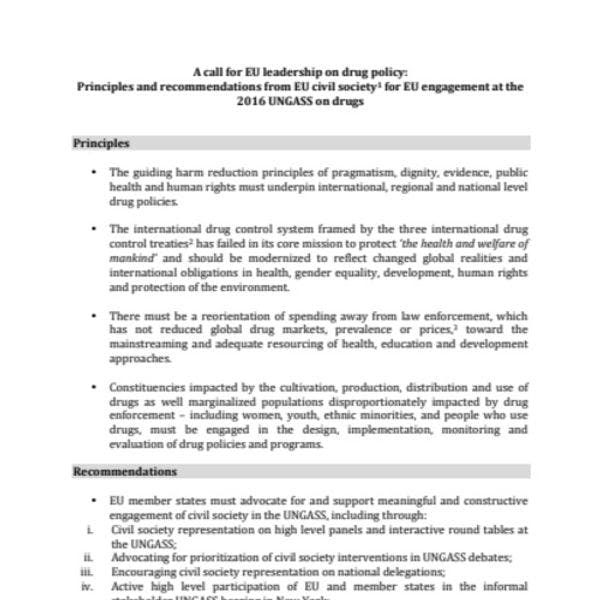Recommandations sur l'engagement de l'UE à la Session extraordinaire de l'Assemblée générale des Nations Unies (UNGASS) sur les drogues
Le groupe d'ONG Européennes de Budapest a signé une déclaration indiquant les points crusciaux à l'ordre du jour sur lesquels il faudra insister lors de l'UNGASS en avril, tels que des politiques basées sur la réduction des risques et un accent mis sur les questions de droits humains pour les groupes vulnérables. Pour en savoir plus, en anglais, veuillez lire les informations ci-dessous.
Abonnez-vous à l'Alerte mensuelle de l'IDPC pour recevoir des informations relatives à la politique des drogues.
The Budapest Group is a network of European NGOs working in the field of drug policy reform, including Harm Reduction International, the Global Drug Policy Program of the Open Society Foundations (OSF), the International Federation of Red Cross and Red Crescent Societies (IFRC), Transform Drug Policy Foundation, the International Drug Policy Consortium (also hear public policy alumna Gloria Lai on the topic here), the Hungarian Civil Liberties Union, and the Transnational Institute.
Following the group's launch at the School of Public Policy in August 2015, a statement has been submitted to the government of the Netherlands, which holds the presidency of the Council of the European Union (EU). This outlines principles and recommendations for EU engagement at the upcoming Special Session of the United Nations General Assembly on the World Drug Problem which will be convened in New York in April.
These principles, which the group and co-signatories maintain are fundamental to rights-based approaches include: drug policies based on harm reduction principles of pragmatism, dignity, evidence, public health and human rights; reform of the international conventions that frame drug control strategies as these have failed in their core mission to "protect the health and welfare of mankind;" and reorientation of spending from law enforcement and drug eradication to health, education, and development.
"The priority message of the Budapest Group is that civil society organizations must have a central role in the UNGASS deliberations, and that marginalized groups disproportionately impacted by drug policies, including women, youth, ethnic minorities, and drug crop cultivators must be engaged in deliberations on, and the design, evaluation, and monitoring of drug policies," explained SPP Associate Dean Julia Buxton.
Also a signatory to the statement, Ursula Sanchez (MPA '16) added, "Having seen how the war on drugs in Mexico has taken the lives of thousands of people without solving the drug trafficking problem, I feel committed to call for change in the current international drug policy framework and to engage as many policy-makers as possible in an informed debate."
Keep up-to-date with drug policy developments by subscribing to the IDPC Monthly Alert.
Téléchargements
Profils associés
- Transnational Institute (TNI)
- Transform
- Open Society Foundations (OSF)
- International Drug Policy Consortium (IDPC)
- Hungarian Civil Liberties Union (HCLU)
- Harm Reduction International (HRI)
